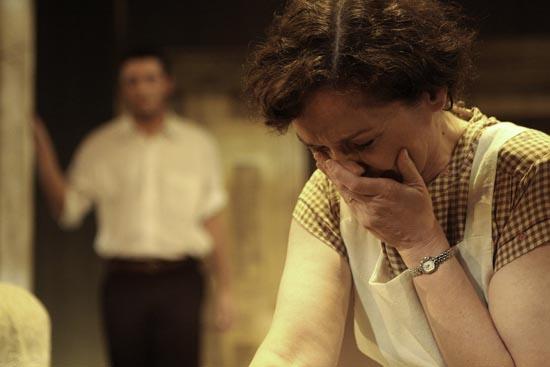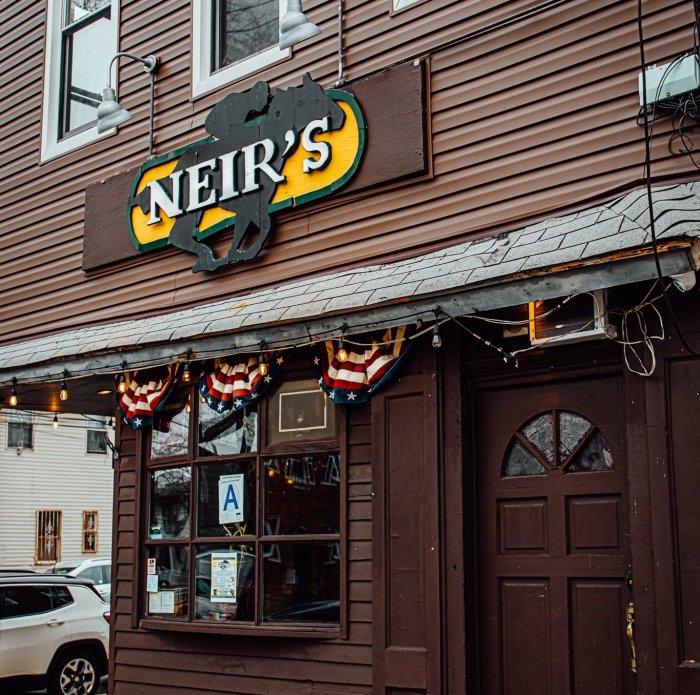By Arlene McKanic
Jack Heifner’s “Home Fires” reminds one of those movies and plays that feature strong, resourceful Southern women who are often forced to take up not only the duties of womanhood but the burdens of their weak or venal men as well −− think “Steel Magnolias” or “Crimes of the Heart” or maybe even “Fried Green Tomatoes.”
Heifner’s play, based largely on memories of his own grandmother and her “Iron Clad Boarding House,” is set in Texas during World War II and beyond. Nettie Morris, a woman whose husband has abandoned her and their three children, has turned her home into a day boarding house to make ends meet. The boarders are the notional neat freak Alice and jolly, frumpy June, who work at the nearby factory; dreamy Maydine, the glove model in a store; and finally Maggie, who’s come to work at the factory as a typist, to Alice’s consternation. An old−fashioned, flame−haired hussy, Maggie is the catalyst who blows everything up.
But then again, maybe everything in the Morris household needs to be blown up. Mrs. Morris loves all of her children, but carps at her restless teenaged daughter Susanna while she dotes on her son, Sonny, whose fear of the war is such that he’s taken to malingering −− his imaginary illness caused him to miss an entire year of high school. Susanna and her sister Nola resent boarders taking their rooms during the day and having to wait on them like kitchen staff in the evening. At the same time, Sonny is allowed to stay in his room and isn’t expected to help around the house −− he’s a boy, after all −− and he’s come to find his mother’s care stifling. The fast, self−absorbed Maggie is his ticket to manhood and a way out of Nettie’s house, and the scene where she tosses him out is both painful and a relief.
Director Laura Wallace−Rhodes, armed with warm memories of her own formidable Mom, lets her actors shine in this play. All of them, Gail Merzer Behrens as Alice, Jennifer Hope as June, Katie Sabo’s Susanna and Gianna Losquadro’s Nola, are good women with their own little quirks. At 15 Susanna is obsessed with lipstick and makeup and looking older, Alice’s catchphrase “Don’tcha know” makes the Morris sisters giggle helplessly, Maydine is such an airhead that she makes Sonny her “date” for Nettie’s weekly pot roast dinner. She actually dresses up and makes him escort her from her bedroom to the dining table.
The tall and willowy Jennifer Hope loses herself so completely in the character of clumsy puppy June that she is unrecognizable. Nettie’s clear preference for her weak son keeps her from being perfect and Jeryl Ann Costello brings out her flaws without losing sight of her good heart. Even the coddled, spineless, aimless Sonny, played by Michael Lynch and Stephanie Bashall’s Maggie have their reasons. In a nice role reversal, he’s the one who’s punished for taking up with her, while Maggie carries on as heartlessly as Mayzie in “Horton Hatches the Egg.”
In this and other ways the play’s morality is refreshingly quaint, and the end will make you cry a little −− bring the Kleenex. Praise should also be bestowed on Brian Howard’s set, a house with both cozy furniture and golden lamplight and torn−up boards with vines growing evocatively in and out of them, Meghan Santelli’s warm lighting design, and Joan King’s costumes. The reviewer was pleased to see that Jennifer Hope is not only a superb singerâ„actress but the play’s music consultant. The music is simple and ranges in mood from wistful to somewhat creepy.
“Home Fires,” another great production by the Broadhollow Theatre Company, will be at the Broadhollow Theatre at 700 Hempstead Turnpike in Elmont, N.Y. until May 3. Performances are 8 p.m. Fri.−Sat.; 3 p.m. Sun. through June 24, 2 p.m. Sun. starting June 30. For more information or tickets call 631−581−2700.

































